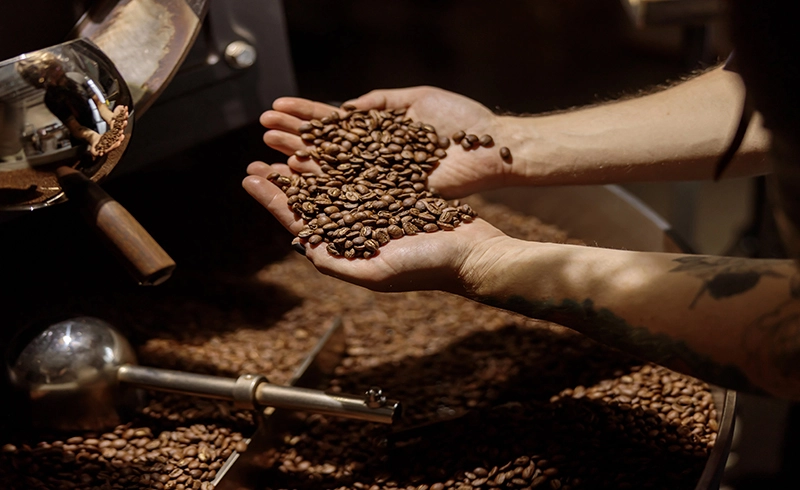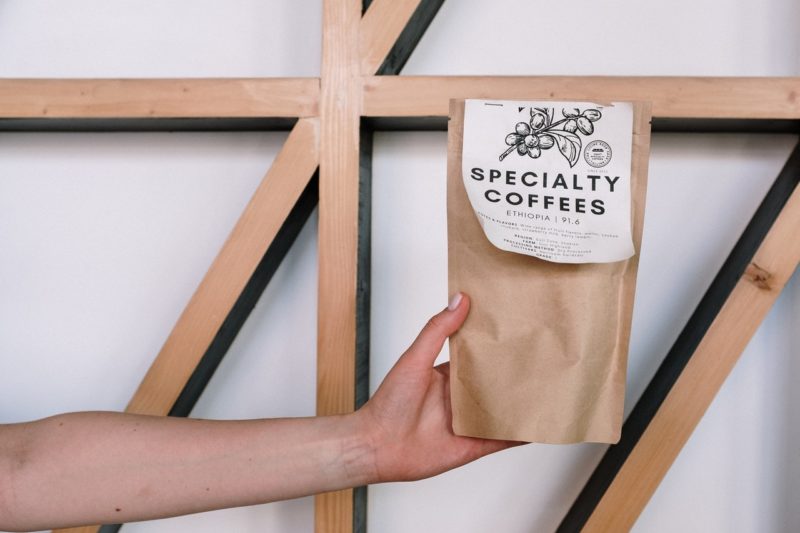Roasting Coffee and Selling it From Home
Hey, have you ever dreamed of turning your kitchen into a mini coffee roastery? Imagine the aroma of freshly roasted beans filling your home, and sharing that joy with others by selling your own coffee right from your doorstep. It’s not just for the pros; anyone with a love for coffee and a bit of entrepreneurial spirit can do it.
So, let’s dive into the world of home coffee roasting together. By the end of this, you might just be ready to start Roasting Coffee and Selling it From Home. Ready to explore how? Let’s get brewing!
What is Roasted Coffee?

It’s basically the transformation station for coffee beans, taking them from their raw, green form to the aromatic, flavorful beans we all know and love. When coffee beans are roasted, they undergo a fascinating process called the Maillard reaction—yeah, the same one that gives grilled steak its flavor. This process browns the beans and unlocks their rich flavors and aromas.
During roasting, beans change color, expand in size, and lose moisture. The longer they roast, the darker they become, and this affects their taste. You’ve got your light roasts that are subtle and complex, medium roasts that strike a nice balance, and dark roasts that pack a punch with bold, robust flavors.
7 Important Tips Before Selling Your Roasted Coffee Beans Online
Diving into the world of selling your roasted coffee beans online? Hold up! Before you make that leap, let me share some insider tips that can set you up for success. Trust me, a little prep now can save you a latte trouble later. Let’s get into it!
1. Know Your Beans
First things first, you gotta know your product inside out. What makes your coffee unique? Is it the origin, the roast profile, or a special blending technique? Your customers will want to know what they’re sipping on, so be ready to share the story behind your beans.

2. Perfect Your Packaging
Looks matter, especially in the world of online shopping. Your packaging is the first thing customers will see, so make it eye-catching and reflective of your brand. But don’t just stop at looks; ensure your packaging keeps those beans fresh and tasty.

3. Set Up a Stellar Website
Your website is your virtual coffee shop. Make it inviting, easy to navigate, and informative. High-quality images, engaging descriptions, and easy checkout options are key. And don’t forget mobile optimization—many shoppers will visit your site from their phones.

4. Get The Word Out
Marketing is your best friend. Use social media, email newsletters, and content marketing to connect with potential customers. Share your coffee journey, brewing tips, and special promotions to keep your audience engaged and coming back for more.

5. Understand Shipping Logistics
Shipping coffee means dealing with freshness and timely delivery. Research shipping options to offer your customers the best rates and delivery times. Consider offering local pickup or delivery if you’re starting small.

6. Gather Feedback and Reviews
Feedback is gold. Encourage your customers to leave reviews and feedback on your website and social media. Positive reviews can boost your credibility and attract new customers, while constructive feedback can help you improve your product and service.

7. Keep Experimenting
The coffee world is always evolving, and so should you. Keep experimenting with new roasts, blends, and brewing methods. Stay curious and open to trends, but always stay true to the quality and authenticity of your coffee.

Starting your online coffee business is an adventure. Keep these tips in mind, and you’ll be on your way to brewing up a storm on the digital front. Here’s to your success—may your coffee always be strong and your sales even stronger!
7 Important Tips When Selling Your Home Roasted Coffee Online
Alright, let’s get down to the nitty-gritty of selling your home-roasted coffee online. It’s not just about roasting those beans to perfection; there’s a whole world out there waiting to taste what you’ve got brewing. So, how do you make sure your coffee doesn’t just blend into the background? Here are seven essential tips to help you stand out and succeed in the online coffee market.
1. Craft a Unique Brand Story
Your story is what sets you apart. Why did you start roasting? What’s special about your method? Your brand story should resonate with your customers, making them feel a part of your coffee journey. This connection can turn a one-time buyer into a loyal fan.

2. Quality Photos are Key
Never underestimate the power of drool-worthy photos. Your online customers can’t smell or taste your coffee through the screen, but they can see it. High-quality, appealing images of your coffee and roasting process can significantly influence their buying decision.

3. Know Your Shipping
Freshness is crucial with coffee. You need to figure out how to get your beans from A to B without losing that just-roasted quality. Research shipping options, and maybe even consider flat-rate deals to offer the best value to your customers.

4. Offer Brew Guides and Tips
Not everyone is a coffee connoisseur. Providing brew guides, tips, and even videos can help your customers get the best out of your beans. It’s not just about selling coffee; it’s about offering an experience.

5. Get Social and Engage
Social media isn’t just for cat videos. It’s a powerful tool to connect with your audience. Share your story, behind-the-scenes glimpses, and engage with your followers. Social proof, like customer reviews and user-generated content, can also boost your credibility.

6. Utilize SEO and Content Marketing
To get noticed online, you need to play the SEO game. Use relevant keywords in your product descriptions, blog posts, and even your images. Content marketing, like blogging about coffee trends or brewing methods, can also drive traffic to your site.

7. Listen and Adapt
Feedback is your friend. Listen to what your customers are saying about your coffee, your service, and their overall experience. Use this feedback to adapt and improve. Remember, a successful business is one that evolves with its customers’ needs.

Selling your home-roasted coffee online can be incredibly rewarding. It’s a chance to share your passion with the world and build a community around your brand. Keep these tips in mind, and who knows? You might just be the next big name in the coffee world. Cheers to that!
What You Will Need for Your Roasted Coffee Business
Starting a roasted coffee business from home is an exciting venture, but it requires some groundwork to ensure success. Beyond passion and dedication, you’ll need to invest in several key areas to get your business off the ground. Let’s break down what you’ll need:

1. Quality Green Coffee Beans
- Explanation: The foundation of your business is the coffee you choose to roast. Source high-quality green coffee beans from reputable suppliers. Consider different origins, varieties, and processing methods to offer a unique selection to your customers.
2. Coffee Roasting Equipment
- Explanation: Depending on your budget and the scale of your operation, you can start with a simple home roaster or invest in a commercial-grade roaster. The right equipment will allow you to consistently produce the flavor profiles you desire.
3. Packaging Supplies
- Explanation: Proper packaging is crucial for preserving the freshness of your roasted coffee. You’ll need airtight bags with one-way valves to let gas escape without letting air in. Consider branding your packaging to enhance your market presence.
4. Branding and Marketing Materials
- Explanation: A strong brand identity and marketing strategy are essential for standing out in the coffee market. This includes logo design, website development, social media presence, and promotional materials like business cards and flyers.
5. Licenses and Permits
- Explanation: Check your local and state regulations to determine what licenses and permits are required to operate a food business from home. This may include a business license, health department certification, and a food handler’s permit.
6. Shipping and Fulfillment Resources
- Explanation: If you plan to sell online, you’ll need to set up a system for shipping and fulfilling orders. This includes choosing shipping carriers, calculating shipping costs, and purchasing shipping materials like boxes and labels.
7. Workspace and Storage
- Explanation: You’ll need a dedicated space for roasting, packaging, and storing your coffee. Ensure your workspace meets any local health and safety standards and is capable of storing your coffee under the right conditions to maintain freshness.
8. Financial Resources
- Explanation: Starting a business involves initial investment and ongoing expenses. This includes the cost of equipment, inventory, marketing, and any renovations needed to set up your workspace. You may need to secure funding through savings, loans, or investors.
9. Education and Training
- Explanation: Understanding the art and science of coffee roasting can greatly impact your product’s quality. Invest in courses, workshops, or books on coffee roasting and business management to enhance your knowledge and skills.
10. Website and E-commerce Platform
- Explanation: An online presence is crucial for reaching a broader audience. A well-designed website and e-commerce platform will make it easy for customers to learn about your brand, browse your products, and make purchases.
By carefully planning and investing in these key areas, you can set a strong foundation for your roasted coffee business. Remember, success in this industry is not just about the quality of your coffee but also about how well you connect with your customers and meet their needs.
Other Ways to Sell Your Home Roasted Coffee
Selling your home-roasted coffee can go beyond just setting up an online store. Diversifying your sales channels can help you reach more customers and grow your business. Here are some effective avenues to consider:

- Farmers Markets and Local Events
- Participate in local farmers markets, craft fairs, and food festivals. These venues offer direct contact with customers, allowing you to share your passion and knowledge about coffee.
- Subscription Services
- Offer a subscription service where customers can receive a regular delivery of your coffee. It’s a great way to build a steady customer base and ensure consistent sales.
- Local Cafes and Restaurants
- Partner with local cafes and restaurants to supply your coffee. This not only increases your sales but also helps in building your brand within the community.
- Retail Outlets
- Approach local grocery stores, specialty food stores, and boutiques to carry your coffee. Some stores may be interested in supporting local businesses through consignment or direct sales agreements.
- Office Supply
- Offer your coffee as part of office supply services to businesses looking to provide quality coffee to their employees. This can be a lucrative avenue with recurring bulk orders.
- Online Marketplaces
- Beyond your own website, consider selling on online marketplaces like Etsy, Amazon, or eBay. These platforms have a large audience and can significantly increase your visibility.
- Social Media Sales
- Utilize social media platforms to sell directly to your followers. Platforms like Instagram and Facebook allow you to set up shop sections and tag products in posts.
- Coffee Tasting Events
- Host coffee tasting events either virtually or in-person. This can be a great way to introduce people to your coffee, gather feedback, and make sales.
- Corporate Gifting
- Offer your coffee as part of corporate gifting packages. Companies are always looking for unique gifts for clients and employees, especially during the holiday season.
- Collaborations with Other Brands
- Partner with non-competing businesses (like bakeries, bookstores, or lifestyle brands) to create bundled offers. This can help you tap into each other’s customer bases.
Exploring these diverse channels can help you expand your reach and find new customers for your home-roasted coffee. Each channel has its own set of advantages and challenges, so consider your capacity, target market, and business goals when choosing the best avenues for your coffee.
How to Start Roasting Coffee and Selling it From Home?

Starting a home-based coffee roasting business involves several key steps: first, gain a solid understanding of coffee roasting techniques and flavors. Next, develop a comprehensive business plan, ensuring you comply with local regulations and obtain necessary permits. Invest in quality roasting equipment and source high-quality green coffee beans.
Focus on creating a strong brand and effective packaging to attract your target market. Market your business online and locally to build a customer base. Begin selling through various channels, such as your website, farmers’ markets, or local cafes. Continuously monitor the quality of your coffee and seek customer feedback for improvement.
Finally, consider scaling your business as demand grows. Success hinges on your passion for coffee, commitment to quality, and adaptability in business.
Wrapping Up
Embarking on the journey of selling your home-roasted coffee offers a unique blend of creativity, passion, and entrepreneurial spirit. This venture not only allows you to share your love for coffee with a wider audience but also showcases the versatility of coffee roasting and selling as a craft.
By exploring various avenues for selling your coffee, from online platforms to local markets, you unlock new opportunities to connect with coffee lovers everywhere. Each cup of coffee you sell carries a piece of your story and dedication, making it a truly unique offering in the world of coffee. So, take the plunge and share your exceptional brews with the world. The path might be full of challenges, but the aroma of success is worth every step. Here’s to roasting, brewing, and thriving in your coffee adventure!
Jl.Surjan
Disclosure: Our blog contains affiliate links to products. We may receive a commission for purchases made through these links. However, this does not impact our reviews and comparisons. We try our best to keep things fair and balanced, in order to help you make the best choice for you.





